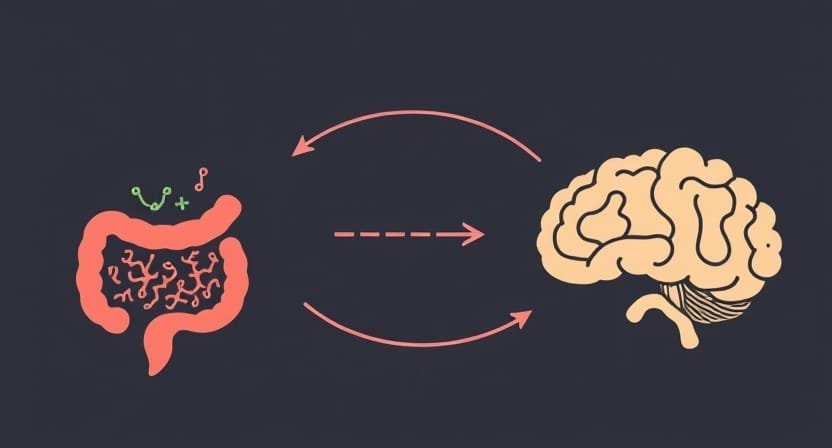What if the secret to aging gracefully isn’t in the latest anti-aging serum or fad diet, but in something you might have never considered before—your gut microbiome?
Table of Contents
Aging is inevitable, but the rate at which we age and how we experience it might not be entirely beyond our control. Thanks to cutting-edge research, scientists are discovering that the trillions of microorganisms in our gut, collectively known as the microbiome, play a crucial role in how we age. In fact, gut health might just hold the key to reversing some of the signs of aging and improving both the quality and length of life.
In this post, we’ll explore the powerful link between gut health and aging, dive into the science behind it, and show you how you can harness the power of your microbiome to age better, feel younger, and live longer.
What Is the Microbiome and How Does It Impact Aging?
Your microbiome refers to the trillions of bacteria, viruses, fungi, and other microorganisms that live inside your body. While we often think of bacteria as harmful, the reality is that many of these microbes are essential for our well-being. The largest and most diverse population of microorganisms resides in your gut—your digestive tract—and these microbes play a pivotal role in maintaining your health.

The Gut Microbiome: A Complex Ecosystem
The gut microbiome is constantly working to:
- Aid digestion and nutrient absorption.
- Regulate your immune system
- Influence brain health and mood
- Protect against harmful pathogens.
However, as we age, the composition and diversity of our microbiome begin to change. Studies have shown that older adults often experience a decline in the diversity of beneficial gut bacteria, while harmful bacteria and fungi can proliferate. This imbalance, known as dysbiosis, can lead to chronic inflammation, weakened immune responses, and an increased risk of age-related diseases like heart disease, diabetes, and Alzheimer’s.
How Gut Health Affects the Aging Process
Your gut is far more than just a digestive system—it acts as a gateway to numerous other biological functions that impact aging. From chronic inflammation to cognitive decline and even skin health, the state of your microbiome directly influences how you age. Let’s explore how gut health contributes to these processes.

1. Chronic Inflammation: The Silent Ageless Killer
One of the primary ways your gut microbiome affects aging is through the process of inflammaging—a term used to describe the low-grade, chronic inflammation that increases as we age. This chronic inflammation has been linked to many age-related diseases, including cardiovascular disease, type 2 diabetes, and even cancer.
How Gut Health Affects Inflammation:
Your gut bacteria play a key role in regulating your immune system. A healthy gut microbiome produces short-chain fatty acids (SCFAs), such as butyrate, which help to regulate inflammation and keep your immune system in balance. But when the gut microbiome becomes imbalanced (dysbiosis), the production of these anti-inflammatory molecules decreases, and inflammatory responses increase, contributing to the aging process.
Studies to Know:
- Nature Reviews Immunology: A 2018 study found that dysbiosis and chronic inflammation increase the risk of developing age-related diseases like Alzheimer’s and cardiovascular conditions.
- The Journal of Gerontology: This study found that older adults with more diverse microbiomes had lower levels of systemic inflammation, suggesting that maintaining a healthy microbiome is crucial for healthy aging.
By improving gut health, you can reduce systemic inflammation, slowing the aging process and lowering the risk of associated diseases.
2. The Gut-Brain Axis: A Direct Link Between Gut Health and Cognitive Function
Did you know that your gut is directly connected to your brain? This relationship, known as the gut-brain axis, plays a critical role in your mental health and cognitive function. A balanced gut microbiome has been shown to enhance brain function, improve mood, and even reduce the risk of neurodegenerative diseases like Alzheimer’s and Parkinson’s.

Gut Health and Brain Health:
- Your gut produces over 90% of your body’s serotonin, a neurotransmitter that regulates mood, sleep, and appetite. Low serotonin levels have been linked to depression, anxiety, and cognitive decline, all of which are more common in aging adults.
- Imbalances in the gut microbiome have been associated with the development of Amyloid plaques, a hallmark of Alzheimer’s disease
Scientific Insights:
- A 2019 study in the Journal of Alzheimer’s Disease found that individuals with more balanced gut bacteria had better cognitive function and a lower risk of cognitive decline.
- The Frontiers in Aging Neuroscience journal also suggests that promoting gut health through diet and probiotics can improve cognitive function and reduce the risk of age-related cognitive diseases.
3. Gut Health and Skin Aging: Is Your Gut the Secret to Youthful Skin?
Your gut also influences the appearance of your skin. In fact, your skin and gut share a common line of defense: the immune system. A healthy gut microbiome supports a healthy immune system, which in turn helps reduce visible signs of aging, such as wrinkles, dry skin, and loss of elasticity.

Gut Health and Skin Health:
- Research shows that inflammation stemming from the gut can lead to increased collagen breakdown, a key factor in skin aging.
- Probiotics, found in fermented foods, can enhance the skin’s barrier function, reduce skin inflammation, and even improve skin elasticity.
Supporting Studies:
- A 2018 study in The Journal of Investigative Dermatology found that people with a diverse gut microbiome had better skin health, including fewer wrinkles and less dryness.
- Another study in International Journal of Cosmetic Science found that fermented foods were linked to improved skin elasticity and reduced visible signs of aging.
Incorporating gut-friendly foods into your diet can not only improve your internal health but also help you maintain youthful, glowing skin.
Cutting-Edge Research: The Future of Gut Health and Aging
The science connecting gut health and aging is still evolving, but promising breakthroughs have been made in recent years.
Fecal Microbiota Transplants (FMT): A Potential Solution for Aging-Related Diseases?
One of the most fascinating areas of research is fecal microbiota transplants (FMT)—a procedure that involves transferring gut bacteria from a healthy donor into the gut of someone with an imbalanced microbiome. Early studies suggest that FMT could help reverse some age-related conditions by restoring a healthy balance of gut bacteria.
While FMT is still in the experimental stages, researchers are hopeful that it could one day be used to treat age-related diseases, including Alzheimer’s, diabetes, and heart disease.

How to Use Your Gut Health to Reverse Aging: Practical Tips
You now know how important your gut is for healthy aging—but how do you harness its power for anti-aging benefits? Here are some actionable steps to improve your gut health and slow down the aging process.
1. Eat a Gut-Friendly Diet
The foods you eat directly impact the health of your microbiome. Here are some key foods that can help optimize your gut and slow the aging process:
- Fiber-Rich Foods: Fiber from fruits, vegetables, whole grains, and legumes nourishes beneficial bacteria. Focus on foods like apples, oats, lentils, and broccoli.
- Fermented Foods: Incorporate probiotics into your diet with foods like yogurt, kimchi, kefir, and sauerkraut. These foods introduce beneficial bacteria into your gut.
- Healthy Fats: Omega-3 fatty acids, found in salmon, flaxseeds, and walnuts, help reduce inflammation and protect against age-related diseases.
- Prebiotic Foods: Foods like garlic, onions, and bananas provide the fiber that nourishes good bacteria.

2. Consider Probiotic and Prebiotic Supplements
Probiotic supplements can help restore a healthy gut microbiome, especially after an imbalance caused by antibiotics or poor diet. Look for supplements that contain strains like Lactobacillus and Bifidobacterium, which are beneficial for aging adults.
3. Manage Stress and Sleep
Stress and sleep deprivation can disrupt your gut microbiome, leading to inflammation. Prioritize stress-reduction techniques like yoga, meditation, or deep-breathing exercises. Aim for 7-9 hours of sleep each night to keep your gut—and your body—functioning at its best.
4. Stay Active
Regular physical activity has been shown to increase the diversity of gut bacteria and reduce inflammation. Aim for at least 30 minutes of exercise most days of the week.
Looking for other ways to enhance your daily routine? Check out our article on the Unlock Your Health: Transform Your Life with These 30-Second Micro-Moments , and discover how small habits can yield significant results!
Frequently Asked Questions
What is the gut microbiome and why is it important for aging?
How does the gut microbiome affect chronic inflammation in aging?
What foods are best for improving gut health and aging?
Fiber-rich vegetables like leafy greens, broccoli, and carrots.
Prebiotic foods like garlic, onions, and bananas.
Fermented foods like yogurt, kefir, kimchi, and sauerkraut, which introduce beneficial probiotics to the gut. A diet rich in these foods can promote gut diversity, reduce inflammation, and potentially slow the aging process.
How do probiotics and prebiotics help in slowing down aging?
Can stress affect my gut microbiome and speed up aging?
What are some signs that my gut health is affecting my aging?
Frequent digestive issues like bloating, constipation, or diarrhea.
Chronic inflammation, leading to conditions like joint pain or skin problems.
Brain fog or memory issues, which could indicate cognitive decline. If you’re experiencing any of these symptoms, improving your gut health through diet, probiotics, and lifestyle changes could help reduce these signs of premature aging.
Can improving my gut health slow cognitive decline?
How can I measure the health of my gut microbiome?
Conclusion: Take Control of Your Aging Process
Your gut microbiome is a powerful ally in the fight against aging. By taking care of your gut today, you can improve your chances of aging gracefully, feeling youthful, and living a longer, healthier life.
Now it’s your turn: Start by incorporating more gut-friendly foods into your diet and consider supplementing with probiotics. Focus on managing stress and getting enough sleep. Your gut health will thank you—and so will your body, mind, and skin.
What changes will you make to your diet to support your gut health? Let us know in the comments below! And don’t forget to share this post with your friends—because everyone deserves to age better!
Maintaining a healthy gut is crucial for aging well, but don’t forget to adopt habits that support overall health. Start your mornings with high-performance habits that boost both mental clarity and physical well-being.










2 thoughts on “Gut Health and Aging: Why Your Microbiome May Be the Key to Reversing Aging”